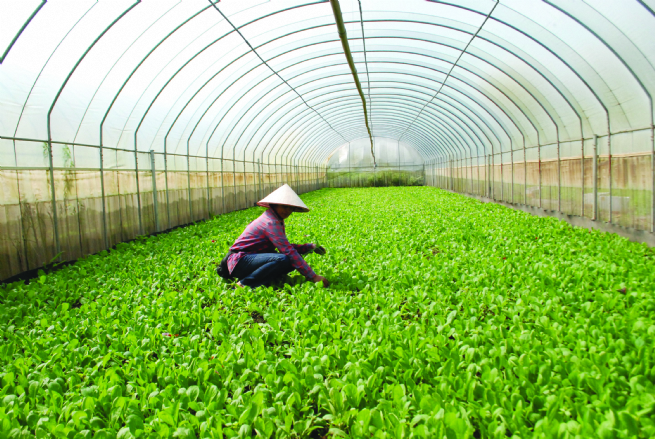Hanoi is one of the high-tech agriculture leaders of the country. The capital city of Vietnam has built 164 high-tech agricultural production models, accounting for 35% of the city's total agricultural production value. Many models have confirmed their social and economic benefits and brought high income to farmers.

The high-tech vegetable farm of the Cuoi Quy Organic Vegetable Cooperative in Dan Phuong district
Regarded as one of the bright examples of Technology 4.0 organic agriculture, Cuoi Quy Hi-Tech Organic Vegetable Cooperative (Dan Phuong commune), led by Ms. Dang Thi Cuoi, is a leading supplier of organic vegetables in Hanoi. “We use only organic fertilizers and probiotics in our production. Instead of spraying herbicides to disinfect the soil and kill pathogens, after the harvest is completed, we use blast burners to kill pathogens all over the cultivation area. This is the Japanese way to kill fungi and insect eggs but still keep worms. Besides, to kill pests, the cooperative makes an organic mixture that is sprayed on the vegetables. Although it does not kill bugs immediately, the mixture directly causes them to stop eating, then they weaken and die, she said.
Using techniques for greenhouse cultivating, seeds are sown on flat ground by a machine and the greenhouse is closed until harvest. After each crop, the soil surface is treated against fungi and pests with gas-fueled blast burners and then fertilized before new crops are planted. On average, the cooperative reaps about 10 harvests a year. Depending on the weather, it takes 18-20 days to harvest vegetables in the summer and 30-40 days in the winter. Realizing the economic efficiency of vegetable farming in greenhouses using drip irrigation technology in many places, Cuoi Quy Hi-Tech Organic Vegetable Cooperative has applied and acquired the most modern, latest technologies from many countries in the world to expand production, improve productivity and raise product quality, thus creating stable jobs for local farmers.
Currently, the cooperative has 17 vegetable products certified for quality under the One Commune One Product (OCOP) Program of Hanoi City. Annual revenue is about VND6.5 billion. Especially, with the desire to jointly develop production and make money from agriculture, the unit has transferred this modern production technology to farmer households and other cooperatives in Hanoi like Tam Xa Cooperative (Dong Anh district), Phung Thuong and Long Xuyen communes (Phuc Tho), and Tram Pagoda (Chuong My). Especially, Ms. Dang Thi Cuoi is also transferring the model to Tan Lap High School based in Dan Phuong district. She said most of the cooperative's products are ordered by traders at the farm with stable prices. Every day, the cooperative supplies 2-4 tons of vegetables such as kohlrabi, cauliflower, tomato and chives to apartment buildings, collectives and three vegetable store chains in the city.
Also actively linking organic agriculture with high-tech applications, Nghia Minh Mushroom Cooperative (Dan Phuong commune) has boldly applied science and technology and adopted modern VietGAP-standard mushroom growing lines on nearly 8,000 square meters of land. Director Tran Sy Hung said that mushrooms are grown in a high-tech farming environment where no chemicals, preservatives or additives are used, even in the packaging process. Currently, the cooperative earns VND500-600 million a year from selling mushrooms and employs 18 employees who are paid VND5-6 million a month each. Thanks to strict control over the production process, for many years now, its organic mushroom products are well-branded in the market. The cooperative has become a reputable partner to supply organic agricultural products to businesses, supermarkets and shops in the capital.
According to the Hanoi Department of Agriculture and Rural Development, Hanoi has 160 hi-tech agricultural production models in place, including 105 crop production models, 39 livestock production models, 15 aquaculture models and one mixed model. The value of high-tech agricultural products accounts for 35% of the city's total agricultural production value. High-tech agricultural models are concentrated in districts such as Me Linh, Gia Lam, Thuong Tin, Dong Anh, Thanh Oai and Dan Phuong.
Mr. Nguyen Van Chi, Director of the Hanoi Rural Development Office, said, to develop hi-tech agriculture, scientific and technological innovations are considered one of the key solutions to deal with challenges in agricultural development, driven by preeminent technological features such as greenhouse technology, automation technology and sensor technology to reduce cost, increase productivity, and improve quality of agricultural products and environmental protection. In the coming time, Hanoi will continue to maintain and develop production and consumption links in concentrated farming areas and increase market access and export-oriented branding. At the same time, the city will develop animal husbandry by applying high technology, circular technology at both farm and household scales, ensuring biosecurity, disease safety, and environmental friendliness. In addition, Hanoi aims to become a supply center of seedings and stocks for the country.
Minh Ngoc